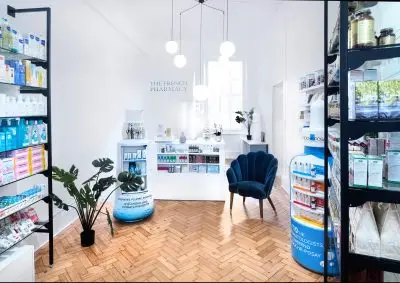How to navigate the UK health system as a newcomer
A guide for new mums
The UK has a different healthcare setup compared to France, with options like the NHS and private healthcare, which may seem unfamiliar at first.
Marine Vincent, doctor in pharmacy and founder of Make Me Feel, a parapharmacie based in Clapham, London and The French Pharmacy located in the heart of Marylebone, shares her wealth of experience in both the French and UK health system. In this article she explains the main differences and how to navigate the UK health system as a newcomer and in particular when expecting for the first time.

1. The NHS (National Health Service)
The NHS provides free healthcare for UK residents, which is a huge benefit when you’re settling in. To access NHS services, you’ll first need to register with a local General Practitioner (GP). Once you’ve registered, you’ll be assigned a doctor – but you won’t usually have the option to choose your GP. If you need to see a specialist or have treatments, be aware that waiting times can be long.
Still, the NHS is rooted in the principle of universality, meaning everyone has access to care, regardless of their situation. Although the waiting times can be challenging, especially for non-emergency care, the system remains free at the point of use.
Things to keep in mind:
- NHS care is free for residents, but there can be long waits for non-urgent services.
- If you want quick access to specialists or more immediate treatments, you might want to consider private care.
2. Private Healthcare
If you’re looking for shorter waiting times and more flexibility in choosing your doctor, private healthcare could be an option to consider. Private care in the UK can be paid through health insurance (like Axa, Bupa, or Aviva) or directly out of pocket. This might be a worthwhile option if you want faster consultations, quicker access to specialists, or specific treatments that might have longer waiting lists through the NHS.
However, private healthcare isn’t always covered by insurance, and out-of-pocket expenses can be high if you don’t have insurance. While it’s a more costly option, it does offer more personalised care, with more flexibility in choosing your doctor and receiving faster services.
Things to keep in mind:
- Private healthcare allows you to choose your doctor and often offers quicker services.
- Insurance may not cover all aspects of maternity care, and there are costs associated with private care that can add up.
3. Pregnancy and giving birth: key differences
Pregnancy and childbirth in the UK have their own approach compared to France. There are some key differences you should be aware of, especially when you’re navigating the system for the first time.
NHS maternity care
Once you find out you’re pregnant, you’ll first visit your GP, who will register your pregnancy and refer you to a midwife. Unlike France, you won’t have a gynecologist appointment initially unless necessary. The midwife will be your primary caregiver during pregnancy, with regular checkups scheduled throughout.
Delivery process
You won’t be admitted to the hospital until you’re 4 cm dilated, even if your waters break. Epidurals are available from 4 cm dilation (usually upon request), although each hospital’s approach can vary. If your water breaks but labor doesn’t begin naturally, induction will take place within 24 hours to avoid infection risks. The UK tends to prefer vaginal births, with cesarean sections only being performed in emergencies.
You’ll need to create a birth plan to outline your preferences, but keep in mind that flexibility is key, as things might change during labor.
Post-birth care
After giving birth, you won’t be placed in a private room. Instead, you’ll be in a shared ward with other new mothers. Your stay is typically short, around 6 to 12 hours if everything is stable. Midwives will help with breastfeeding, but the level of postnatal care might feel more minimal than what you’d expect in France.
Things to keep in mind:
- Free of charge, with emergency care available if needed.
- Fewer medical interventions during pregnancy (more emphasis on natural birth).
- A less medicalised approach, with fewer appointments but plenty of support from midwives.
- Limited appointments, especially during early pregnancy.
- Sometimes longer wait times and fewer comforts during the post-birth stay.
4. Private maternity care in the UK
While NHS care is free, some families opt for private maternity care for additional comfort and more personalised services. Private care isn’t usually covered by insurance, but it can be an option if you prefer more tailored support.
Benefits of Private Maternity Care
- Comfortable private rooms and a more personalised, relaxed environment.
- You can choose your doctor, ensuring continuity of care throughout pregnancy and delivery.
- More frequent checkups and additional services like physiotherapy for pelvic floor exercises post-birth.
Types of private maternity care:
- Fully Private Hospitals (e.g., Portland Hospital): Costs around £20,000 for the entire process.
- Private Wings in NHS Hospitals (e.g., St Thomas’ or Chelsea and Westminster): These are part of the NHS but offer a more private experience, with costs around £15,000.
Private care tends to favor quicker decisions for cesarean sections, making it a preferred option for some families, though it’s often seen as more interventionist.
Private perinatal care for French-speaking families
For those who prefer French-speaking professionals, the UK does have several private perinatal practitioners who cater to French-speaking families. Services include midwives, doulas, and other specialists, making it easier for you to receive support in your own language.
5. Pediatrics
Once your baby is born, your healthcare journey continues. In the UK, the Red Book (Personal Child Health Record) will be issued at birth. This book tracks all of your baby’s important health milestones – from vaccinations to growth and development.
Follow-up care in the first few months:
Both mother and baby will be monitored at home, with regular visits from midwives and health visitors. These visits are crucial for your baby’s development and your well-being. Health visitors conduct assessments and offer guidance, especially if you have concerns about your baby’s health or feeding.
Many GP surgeries offer dedicated “Baby Clinics” where you can weigh your baby and ask any questions you may have.
Vaccinations:
The UK has its own vaccination schedule, which is free of charge. However, if you prefer to follow the French vaccination schedule, you can do so by consulting with French-speaking pediatricians in private clinics.
6. Pharmacies in the UK: what you need to know
Pharmacies in the UK play a vital role in supporting your healthcare needs, especially during pregnancy and early motherhood. Unlike in France, where pharmacies often provide an extensive range of medical advice and services, UK pharmacies have a more streamlined focus but remain a cornerstone of healthcare. Here’s what to expect:
Types of Pharmacies
- High-street pharmacies
Major chains like Boots, Lloyds, and Superdrug are common across the UK. These pharmacies offer over-the-counter medications, basic healthcare advice, and prescription dispensing. They also stock a variety of maternity and baby products, including vitamins, baby formula, and skincare essentials. - Independent pharmacies
Smaller, locally-run pharmacies provide a more personal approach, often with pharmacists who take extra time to answer your questions. They may stock specialised or hard-to-find products, making them a good choice for niche healthcare needs.
Key services for new mums
- Prescription Medications: Prescriptions from your GP or specialist can be filled at any pharmacy. Many offer electronic prescription services, saving you time.
- Pregnancy and Postnatal Support: Pharmacies often stock prenatal vitamins, iron supplements, and products for postnatal recovery, such as nipple creams and breast pads.
- Vaccinations: Some pharmacies offer flu vaccines and other immunizations that may be recommended during pregnancy.
- Health Advice: Pharmacists are trained professionals who can provide advice on minor health issues for both you and your baby, such as managing colic, teething, or common colds.
- NHS Prescriptions are free for pregnant women and for 12 months after giving birth, provided they have a valid maternity exemption certificate (MATEX).
- Prescriptions are free for children under the age of 16 (or under 19 if they are in full-time education).
- Private prescriptions issued by private doctors are subject to payment.
Private pharmacy for French-speaking families

The French Pharmacy in the heart of Marylebone offers private pharmacy services for French-speaking families. You can visit the pharmacy at 10 New Cavendish road, W1G 8UL or visit the website www.thefrenchpharmacy.co. The French Pharmacy also offers a wide range of products available online.
You can also visit the parapharmacie www.makemefeel.co.uk located on Abbeville road in Clapham.
Whether you opt for NHS care or go private, there’s plenty of support available, but each path offers different advantages.
If you’re ever in doubt, don’t hesitate to ask for help from your GP, midwife, health visitor or local pharmacy. They are there to guide you through each step of this beautiful yet sometimes overwhelming journey.




